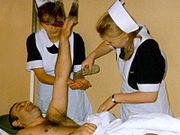
Nurse's cap
Encyclopedia

In some schools, a capping ceremony presents new nursing students their caps before beginning their clinical (hospital) training.
History
The nurse's cap was derived from the nun's habit and developed over time into two types:- A long cap, that covers much of the nurse's hair, and
- A short cap, that sits atop the nurse's hair (common in the United Kingdom).
The nursing cap was originally used by Florence Nightingale
Florence Nightingale
Florence Nightingale OM, RRC was a celebrated English nurse, writer and statistician. She came to prominence for her pioneering work in nursing during the Crimean War, where she tended to wounded soldiers. She was dubbed "The Lady with the Lamp" after her habit of making rounds at night...
in the 1800s.
Advantages

Disadvantages
Some claim the cap is a potential carrier of bacteriaBacteria
Bacteria are a large domain of prokaryotic microorganisms. Typically a few micrometres in length, bacteria have a wide range of shapes, ranging from spheres to rods and spirals...
and other disease-causing pathogens that could then be transmitted from patient to patient. However, such incidents can be prevented when infection control procedures are followed.
Nurses' caps since the 1980s
The use of nurses' caps in the medical facilities of the United StatesUnited States
The United States of America is a federal constitutional republic comprising fifty states and a federal district...
(as well as many other nations) all but disappeared by the late 1980s with the near universal adoption of "scrubs." Also, the rapid growth of the number of men in nursing also necessitated a unisex uniform. However, nurses' caps can still be found in many developing nations, as well as some countries where women still make up the overwhelming majority of nurses.

